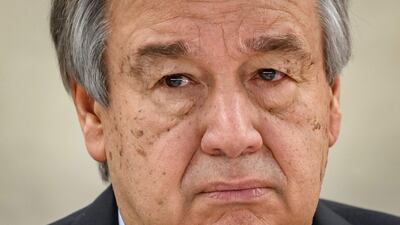“The coronavirus pandemic is the worst global crisis since the Second World War”. These words, uttered by the United Nations Secretary-General Antonio Guterres on Tuesday, offer a chilling perspective on the weeks to come, as even the world’s most developed nations struggle to contain the spread of Covid-19.
US President Donald Trump has warned of a “painful two weeks” ahead in America, which has recorded the highest official number of coronavirus cases in the world, with 200,000 people infected and more than 4,000 dead. These figures are only likely to climb. According to the calculations of the US emergency task force created to battle the virus, even if draconian measures are implemented, between 100,000 and 240,000 Americans could die within months.
These grim predictions suggest that the world is heading into an even more difficult period. There does not yet exist any clinically proven treatment for Covid-19, and up to a quarter of all those infected may be asymptomatic, according to the director of the US Centres for Disease Control and Prevention.
Despite an avalanche of bad news and dreary predictions, however, humanity is not helpless in the face of this disease.
Many countries have already taken decisive actions to stem the tide of the pandemic. A large number have enforced some type of lockdown, restricting international flights and national transport, and urged their people to stay at home. In the UAE, authorities have extended a nationwide sterilisation campaign to mid-April and, as a precaution, students will continue their academic year remotely. Moreover, all those with symptoms, underlying conditions or coming in from abroad can get tested for free, while patients are covered for their treatment.
In Saudi Arabia, meanwhile, all coronavirus patients will also receive free medical treatment. Saudi authorities have also warned prospective pilgrims for Hajj, due to take place in July, not to book their travel arrangements too far in advance, as the situation remains uncertain. The Umrah pilgrimage, for the time being, has been cancelled for both residents and foreigners, and religious gatherings, including for regular prayers, have been suspended in most countries. Images of the holy Kaaba, completely deserted, and video footage of Pope Francis, delivering a blessing to the world and praying alone in the Vatican, have been shared worldwide. That places of worship, where people often find solace in times of uncertainty, have been closed to the public reflects the gravity of the situation. In some places where religious services and events were not shut down, transmission rates within associated communities increased dramatically.
Stricter measures have been taken all over the world to slow the spread of the virus, but their efficacy largely relies on the willingness of ordinary people to abide by them as closely as possible. Companies too, must accommodate employees in their desires to protect themselves, their colleagues and their families. Rigorous self-isolation is an absolute necessity for those who may have been exposed to the virus through interaction with someone confirmed to be infected, or from travel abroad. It is also vital that people remain at home, leaving the house only when absolutely necessary, and work remotely where possible. Washing one’s hands regularly with soap, sanitising surfaces and avoiding touching one’s face are all important, too.
Containing this pandemic requires international co-operation, national efforts, and constant vigilance among individuals. If we mobilise, together, at all levels, we can bring this difficult chapter to a close sooner rather than later.


